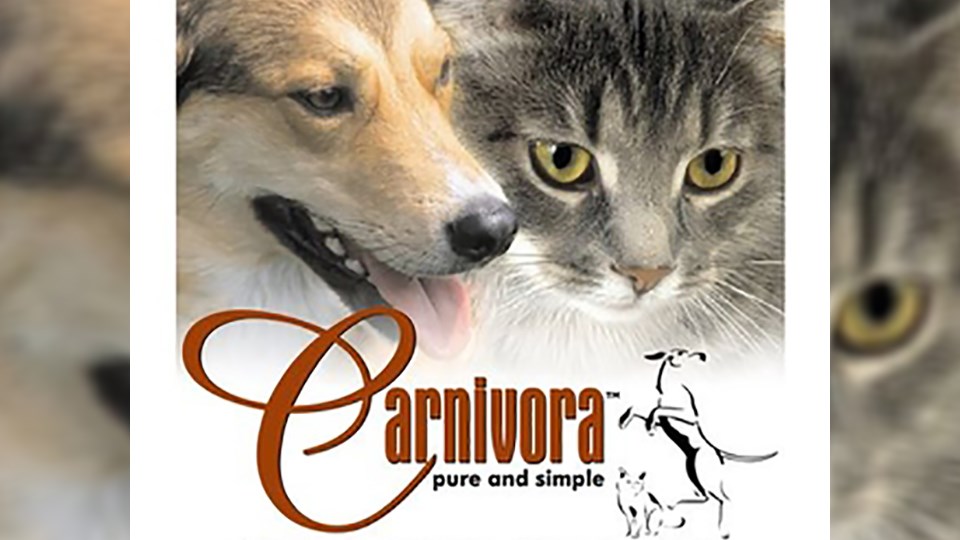The Public Health Agency of Canada (PHAC), in collaboration with provincial public health partners and Health Canada, is in the process of investigating an E. coli 0157 outbreak that has so far led to infections in three provinces.
Carnivora frozen raw pet food has been identified as the likely source of the outbreak, seeing as all individuals who became sick reported exposure to the product or dogs fed this product, before exhibiting symptoms.
“This outbreak serves as a reminder that raw pet food products contain raw meat and should be handled no differently than other raw meat products,” said PHAC in the recall.
Recalled product
| Product | Size | UPC | Codes | |
|---|---|---|---|---|
| Carnivora Brand Whole Animal Chicken Dinner with Vegetables ‘n’ Fruit, Ultra Premium Fresh Frozen Patties for Dogs & Cats | 4 lb / 1820g bag | 689076622271 |
13-01-20/ 006 15-02-20/ 042 20-01-20/ 006 20-02-20/ 042 |
|
| Carnivora Brand Chicken Dinner with Vegetables ‘n’ Fruit | 25 lb / 11.36 kg Bulk Box | 689076619677 |
13-01-20/ 006 15-02-20/ 042 20-01-20/ 006 20-02-20/ 042 |
|
| Carnivora Brand Whole Animal Beef Dinner with Vegetables ‘n’ Fruit, Ultra Premium Fresh Frozen Patties for Dogs & Cats | 4 lb / 1820g Bag | 689076622370 |
13-01-20/ 006 15-02-20/ 042 20-01-20/ 006 20-02-20/ 042 |
|
| Carnivora Brand Beef Dinner with Vegetables ‘n’ Fruit | 25 lb / 11.36 kg Bulk Box | 689076621076 |
13-01-20/ 006 15-02-20/ 042 20-01-20/ 006 20-02-20/ 042 |
|
| Carnivora Brand Whole Animal Turkey Diet, Ultra Premium Fresh Frozen Patties for Dogs & Cats | 4 lb / 1820g Bag | 689076623971 |
13-01-20/ 006 15-02-20/ 042 20-01-20/ 006 20-02-20/ 042 |
|
| Carnivora Brand Turkey Diet | 25 lb / 11.36 kg Bulk Box |
|
13-01-20/ 006 15-02-20/ 042 20-01-20/ 006 20-02-20/ 042 |
The products were sold in British Columbia, Saskatchewan, Manitoba, but may have been distributed in other provinces or territories.
Investigation summary
As of June 12, there are four confirmed cases of E. coli 0157 linked to this outbreak; one in British Columbia, two in Alberta and one in Manitoba. The individuals in question are between three and 43 years of age and became sick between early March and mid-May, 2020.
Two individuals have been hospitalized. No deaths have been reported.
It is possible that more recent illnesses will be reported in the outbreak because of the delay between when a person becomes ill and when the illness is reported to public health officials. For this outbreak, the illness reporting period is between three and four weeks.
Symptoms
People infected with E. coli can exhibit a wide range of symptoms, none at all, or such severe illness that hospitalization is necessary. In all of these instances, it is possible that a carrier can spread the infection to others.
The following symptoms can appear within one to ten days after contact with the bacteria:
- Nausea
- Vomiting
- Headache
- Mild fever
- Severe stomach cramps
- Watery or bloody diarrhea
Most symptoms end within five to ten days, said PHAC in a press release, those who experience prolonged symptoms should contact their health care provider.
There is no real treatment for E. coli infections, aside from monitoring the illness, providing comfort, and preventing dehydration through hydration and nutrition.
Further complications are possible, however, including stroke, kidney failure and seizures, which could lead to the need for further treatment or death.
Who is most at risk
E. coli 0157 is more likely to cause severe illness than other strains of E. coli, said PHAC, but the majority of those infected will still recover on their own.
Pregnant women, those with weakened immune systems, young children and older adults, are the populations most at risk for developing serious complications.
How to protect your health
Check to see if you have recalled Carnivora brand frozen raw pet food in your freezer, and if so, contact the retailer where it was purchased for a full refund or exchange.
Do not feed the affected product to your pet.
PHAC also recommends washing and sanitizing any containers, utensils and surfaces that the raw foods touched before using them again, including countertops, microwaves and refrigerators.
Moving forward, consumers are encouraged to:
- Always wash hands thoroughly with soap and warm water after feeding, handling or cleaning up after pets. Animals fed raw meat diets are more likely to be shredding harmful bacteria like Salmonella and dangerous strains of E. coli, even when they appear healthy, than those fed commercial kibble or cooked diets.
- Regularly clean surfaces that come into contact with pet food or pets
- Store all pet food and treats away from where human food is stored or prepared, when possible, and away from the reach of young children
PHAC does not recommend feeding raw pet food to pets, especially in households with young children. It is recommended that consumers instead buy from companies that use meat-derived ingredients that have been prepared in sanitary conditions and passed inspection for human consumption.
The public is also encouraged to look for companies that have a Hazard Analysis and Critical Control Points protocol in place, which sets safety standards and practices, to reduce the risk of bacterial contamination.
